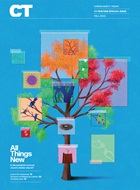The worship leader or production technician applies artistic creativity and technical proficiency to achieve excellence in worship. She is often frustrated by financial constraints imposed on her by the administration. Why should money limit the worship experience?
The financial manager or treasurer applies detailed business skills and a knack for numbers to achieve excellence in stewardship. He knows that not all requests for money can be satisfied. With limited resources, why spend money on items that offer no tangible benefit to the church's mission?
As the technician and the treasurer each pursue their own brand of excellence, they sometimes meet—head-on. Ministry relationships can be stretched to the breaking point, and beyond. But it doesn't have to be that way.
The road to cooperation begins when audio-visual technicians and administrators realize the importance each function plays in presenting the best possible worship experience for their church. "The shared goal is to clearly communicate the spoken and sung message," says Kent Morris, president of Cornerstone Media in Lilburn, Georgia, a church audio-visual systems design and consulting firm. If everyone shares that goal, then administrators support the use of necessary equipment, and AV techs strive to use the least amount of equipment that will achieve the goal. But how does that work in day-in and day-out decisions?
Getting Real
Dave Wagner, technical coordinator, and Hector Diaz, administrative pastor, of Mt. Paran Church of God in Atlanta, Georgia, understand how these roles work together to ensure technological stewardship. "There's a lot of mutual appreciation," says Wagner. "I'll see the administrative pastor and his team at an event and understand they may not know what it took to connect all the nuts and bolts, but that they know it took a lot. That's a good feeling, because we work in a spiritual realm and that's something we have to cultivate—to assume the best of each other."
This awareness of technological stewardship adds to the long-term viability of both the technical and administrative positions. Administrators who attend high-quality worship events and concerts can learn the technical and staffing levels needed to attain that high level of excellence.
"A church may not be able to match that level of excellence, but they can at least become aware of the goal," says Morris. "They can see technical and aesthetic excellence firsthand, and then set a goal to reach a certain percentage of that goal."
Worship audio-visual technicians and financial staff need each other because they both possess specialized areas of expertise. For instance, financial people can help technical people become more aware of the purchasing process and how to maintain a business relationship. Technical people can help administrators become more fluent with vendors and the services they offer. "The idea of stewardship is not just getting the cheapest price, but nurturing or almost parenting that money to see that it serves the highest good," says Morris.
Rising Complexity
The glue of teamwork is having an understanding of what your teammates actually do, and why it matters to you. Wagner says worship technicians want administrators to know more about the level of planning and the requirements necessary for a great audio-visual presentation. This includes the pre-event planning and the kinds of adjustments needed at times when circumstances change.
The level of complexity is increasing because the expectations of congregations are constantly on the rise. Morris says that most administrators don't realize that media requirements today take up ten percent of new building capital outlay, as opposed to two or three percent in years past.
"People today expect a Willow Creek or a Saddleback type of experience," says Morris. But if the AV tech is expected to deliver a caviar performance on a hamburger budget, he can't do it. He needs tools to deliver that level of performance. "Those tools cost a great deal of money—they have to be in place," says Morris.
Administrators would like worship technicians to know that they are busy and burdened with the needs of all the other ministries in the church. Technicians also need to be aware that church financial administrators have a more difficult role than their counterparts in private business.
"A church is completely dependent on giving, and in that environment, they have to be very conservative," explains Morris. "A church's primary role is to maintain its present ministry and then be able to afford other ministries. While the AV segment is vital and you can't have a service without it, there are other areas that need to be addressed as well."
Mutual Awareness
To get these messages across, administrators and techs need to become teachers and seek out ways to educate their colleagues about their roles. Regularly scheduled business meetings are one setting to deliver these lessons. Administrators can make techs aware of the other infrastructure costs associated with running a church, such as the monthly utility bill. And technicians can make the administrators aware of how costly their equipment is.
"These items aren't costly because the techs are going after Cadillacs," says Morris. "Now, even Chevrolets cost $20,000. A small-town AV system was $2,500 and now it's $10,000 to $12,000. That's where we're headed in this technology-driven culture, and the church has to follow."
Another way for techs and administrators to learn about each other's roles is to spend an afternoon watching the other person do their job. A tech can sit at a finance meeting and learn more about the level of financial commitments and requests a church deals with, from major building renovations to helping a poor family get heat when their furnace breaks down.
The financial administrator can in turn attend a Thursday-night worship rehearsal service and learn all the varying needs of techs, musicians, and singers. They can also learn how the equipment is working and get a better handle on the level of technical needs that exist.
Morris suggests an additional environment for mutual learning: get away from the church for a while. "Schedule an afternoon where you can go to lunch together," he says. "Take it out of the church environment where there's a lot of stress, and find a neutral environment."
Speaking In Tongues
These kinds of information-gathering steps are especially needed in the relationship between administrators and technical people because there is indeed a built-in tension between the kinds of people who gravitate toward each role. This kind of tension is especially noticeable at the start of a project. "It's the nature of two different languages being spoken," observes Wagner. "One is pure technology and the other is pure business. So you have to learn to speak each other's language."
When a financial question is raised by Diaz and the other administrators, Wagner and his team strive not to hear the concern as "they are trying to hold us back," but instead interpret the message as "we're all in this together."
In church teams, these kinds of differences show themselves at particular, consistent places. "Accountants are generally under the impression that technical folks exist to spend money on cool gadgets," says Morris. "And the techs are under the impression that accountants are anti-technology, anti-systems, and always say no."
The areas of conflict are not always major ones. Wagner says he and Diaz look for those areas of "constant little smooth-outs" and address them before they fester into major bones of contention. "If you stay on top of these, you keep away from the bigger collisions," says Wagner. "We've worked together for so long that we can see these things coming."
Working In Harmony
When the relationship is working well, the result is a balanced recognition of artistic excellence and financial accountability. One area where this is noticeable is in a high level of communication. Wagner regularly keeps Diaz posted on the progress of projects and events with the goal of "no surprises."
"If an event is coming up and it's turning into something more than we thought," says Wagner, " then we turn it back around to the administration and say, 'this looks like it will be larger in scale—how do you want to support this?' Then we keep going back and forth as needed."
The same process holds true when planning the technological aspects of a building project. If the technical and administrative people are both spiritually mature and stewardship-minded, they can agree to delay the implementation of certain technical parts of the worship presentation if the budget demands it.
"They can include the core products in the infrastructure and add the rest later," advises Morris. "Or, if a church has some kind of windfall where someone is about to give a large amount, then the AV needs can at least be part of the conversation."
Wagner and Diaz have the advantage of years of experience as colleagues. They know each other's personalities and working styles, and they use this knowledge to tailor communication and head off potential conflicts.
"Hector is a fair person and a very straight-shooting business person," says Wagner. "There may be some people I want to candy-coat things with, but he doesn't need that. The best thing is to give him the Reader's Digest™, as-ugly-as-it-is version and let him deal with it. He's seen it before."
Techs and administrators work well when they do not try to thwart each other's purposes or find ways to beat the system. One of these ways, says Morris, is for techs to skirt purchase order spending limits by breaking large items down into smaller increments. "So a tech will break down a $500 or $600 item into $250 pieces and keep it under the radar," he says. "In a healthy relationship, you don't see that."
Likewise, a healthy relationship does not include financial people who "value engineer" the dollar amount of a project down to where it doesn't serve a valid technical purpose. Morris says quality and functional differences are real and important, even in choosing products that appear (to the non-technical person) to do the same thing. "A Camry and a Ferrari both have four tires and a steering wheel, but they're not the same," he says.
Theology-Technology
It's important to keep sight of the key role played by theology and spirituality. Great church teams function when their members pray for one another. "I am praying about an event, and I know the business administrator is praying about the event, too," says Wagner. "I assume we're all on the same side, instead of 'us vs. them.' There's a very active force trying to convince us that we're not on the same side, and that's our enemy. His tried-and-true plan is to divide and conquer."
The theology of an individual church or denomination colors the entire relationship between worship techs and financial administrators. Churches that operate on a seeker-sensitive model (i.e., Willow Creek or Saddleback) expect crisp visuals, a great band, drama, and a Broadway-quality sound system. "The thrust of the theology will determine how you do your technology," says Morris.
Morris says horror stories about the relationship between worship techs and financial administrators are decreasing in frequency, primarily because more churches recognize the importance of technology. Also, the "artistes" and the "bean counters" are becoming more adept at each other's roles.
Just as financial administrators are accepting the place technology plays in enhancing worship, production arts people are beginning to gain necessary understanding in areas like budgeting and finance. "We're starting to see a new group of media pastors and tech directors who have some accounting background, says Morris. Being able to read a profit-and-loss statement is a huge step for production arts people to understand the challenges facing church financial administrators. The bottom line: having a basic understanding of each other's roles and accepting both as equally valid will bridge the gap between worship arts and church finance.
Lee A. Dean is a freelance writer in Michigan.
Copyright © 2008 by the author or Christianity Today/Your Church magazine.
Click here for reprint information on Your Church.

Support Our Work
Subscribe to CT for less than $4.25/month

























